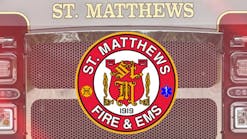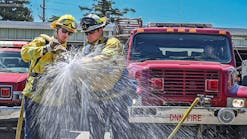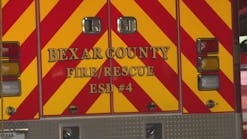Would you want you at your emergency? It’s a legitimate question. We all would certainly want the best of the best arriving on the latest apparatus, utilizing state-of-the-art equipment, making our worst day just a little bit better. Does the public we are sworn to serve and protect deserve anything less? But is that what they are getting when you and your fire department arrive at their emergency?
If you were remodeling your kitchen or buying a new car, would you simply go with the first name that an Internet search provided? Au contraire, you would research the names and reputations of local businesses and choose the one that best fits your needs and budget. But the public does not have that luxury, do they? The public does not have a choice when they dial 9-1-1. They get you and your fire department. Have you prepared for their emergency?
Do you meet the standards or exceed them?
It has been stated, “Don’t let a minimum standard be your maximum performance.” Does your department encourage its members to continue their education beyond the basic entry-level or introductory program? Does your department encourage its members to make advanced learning a life-long commitment? How about you as an individual? Do you seek out advanced education even if your department does not? If you are a member who truly believes in the nobility of public service, anything less than striving to become a master of your craft is to deliver the public an inferior product.
We must endeavor every day to be better than we were the day before. We must learn something new about the job every day, and with the advent of the Internet and smartphones, this task has never been easier, and the excuses never more invalid. Between blogs, websites, digital magazines, webinars, webcasts, and myriad other web-based publications, one could literally search for a lifetime and not run out of topics. And best of all, the bulk of it is absolutely free.
Your department most likely has a number of “old folks” as members. You know the ones, they sit in the back row at meetings, they rarely speak, and then one day they are gone. Have you ever taken a moment to pick their brains? Chances are, they have been where you are and have done what you are doing. This gives them a world of experience, ready to be delivered only for the asking. They may be the folks who started your department. They gave their 30 years on the line, now all they want is to feel welcomed in the house they helped to build. Do you know your department’s history? They do, unequivocally and without conjecture or supposition. They are your department’s history, and to allow them to languish into obscurity and then the deceased member roll without elevating them, revering them, showing them their worth to you and the department is nothing short of criminal. You could learn a lot from this group, but you have to be present, and you have to want to learn. You have to want to be better than you are today. Just remember, God gave you two ears, but only one mouth: the reason why is for you to figure out.
What kind of firefighter are you?
Do you show up 30 minutes early to a meeting, or stay 30 minutes after the meeting was adjourned, to learn about a piece of equipment on the rig? Do you offer constructive ideas at the meeting or just simply jump on the naysayers’ bandwagon? Are you part of the vocal minority who always bring problems to the forefront but never solutions? Regardless of whether you are part of the department’s administration or not, you signed on to be a problem-solver. The exact words may not have been spoken when you raised your right hand and swore your oath, but it certainly was in the spirit of that oath. The moment you repeated “All of the duties incumbent upon me,” you made a promise, a promise to the community and to your department, to be a problem-solver. It’s no different on the emergency scene than it is in the meeting room. You are expected and you are obligated to make bad things good, and to make good things better. And the only way to do that is to be engaged, fully engaged. You’ve got to be plugged in to your department and into the delivery of its mission, all of its mission.
Do you show up early and stay late on drill night, or do you show up 15 minutes late, make sure your name is accounted for, then slide out the back door into the darkness like a thief in the night? If the latter, then that is exactly what you are: a thief. You steal from the public trust. You steal from the reputation of your fire department, from the very men and women you claim as your brothers and sisters, those who labored, and continue to labor, diligently, with honor and integrity, to build that from which you erode. Mastery of technique is born on the training ground. Your aptitude comes with you, but your skills are honed on the training ground. The relentless pursuit of perfection should be your motivator. Notice the word “pursuit” was used. Perfection is rarely attainable, but in the immortal words of Vince Lombardi, “Perfection is not attainable, but if we chase perfection we can catch excellence.” That should be your true and final goal: excellence. Excellence in the knowledge of your craft, excellence in the execution and delivery of your craft, and excellence in the respect of your craft. Your fire department should demand it. The public certainly deserves it.
It’s about more than t-shirts and helmet stickers. Don’t take that the wrong way, departmental pride is a wonderful and healthy thing, but only when coupled with positive departmental performance. This is truly where the metal meets the meat. This is where an amateur department becomes a professional department; professional in attitude and performance, not in paychecks and benefits. Truth be told, the greatest benefit you will ever receive is the opportunity to serve. The greatest reward you will ever receive is the work itself. This is where John Pym’s quote “Actions are more precious than words” becomes steadfast and unwavering. Success and failure are the ultimate measures of performance, and they are unforgiving, for they are both born from need, and both live and die at the hands of performance.
How good or great do you want to be? Is mediocrity appealing to you, or does it leave you aching for more; aching to be better than you are today? Mediocrity breeds inefficiency. On an emergency scene, a place where lives actually do hang in the balance, inefficiency is a potential killer. In a fire department, a place where saving property is part of the mission statement, inefficiency is a potential reputation killer. You can be good or you can be great; the choice is absolutely yours to make. What’s it going to be?
Membership in a fire department is more advanced than most any other organization. Fair or not, we are held to a higher standard than that of the average citizen. We are expected to walk the talk. But remember, we are not extraordinary people. On the contrary, we are a collective of ordinary people that do extraordinary things. When we perform admirably, the accolades we receive lift the entire fire service, just as a rising tide lifts all boats. But unfortunately, the opposite is more often than not devastatingly true. When one of us falls off the pedestal upon which the public places us, the entire fire service receives the proverbial black eye.
The public you serve expects trained, competent professionals, regardless of career or volunteer, in their time of need. On their worst day, they expect you to be on your best day. They deserve nothing less. They expect you to be able to perform, and perform you must, to near perfection. They entrust you with their most prized and valued possessions and property. They hand you their children when all their hope was placed in a single, frantic call to 911. They do not have the option to call a “time-out” if they do not like the way the incident is developing. They do not have the option to call another fire department. They have 9-1-1, you, and your fire department; 9-1-2 does not exist. Would you want you at your emergency?
JAMES L. JESTER is a career captain and acting assistant chief with the Salisbury, MD, Fire Department and a volunteer assistant chief with the Ocean City, MD, Fire Department. He is an instructor for the Maryland Fire & Rescue Institute, specializing in Firefighter Survival & Rescue and the Rescue Technician disciplines. Jester pens a quarterly newsletter for his career department and is a Special Operations Team Leader. He has been published in numerous periodicals in his home town of Ocean City, MD and has lectured for the Maryland State Firemen's Association and Firehouse Expo.






